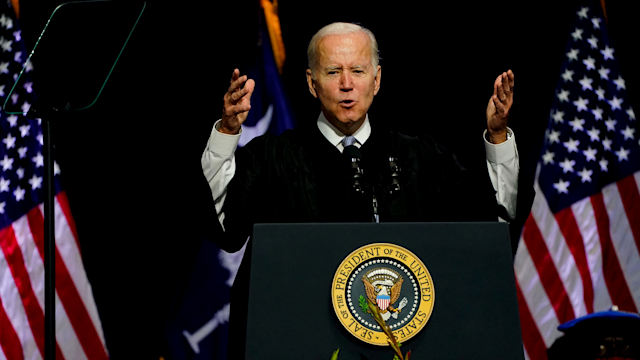News
Lisa Cook could soon become the first Black woman on the Fed. Republicans say she’s not qualified.

Republican senators have attacked President Biden’s historic nomination of a Black woman to the Federal Reserve, calling her “fundamentally not qualified” and setting the scene for a tense nomination hearing Thursday in the Senate.
If confirmed, Lisa D. Cook, a Michigan State University economist renowned for her research into how racial inequality and violence have stifled economic growth, would be the first Black woman to serve on the Fed in its 108-year history.
However, conservatives have dismissed Cook’s academic and professional credentials and cast her as a radical racial justice activist, echoing the charged language deployed against a similar historic prospect on the Supreme Court after Biden vowed to nominate a Black woman to the bench.

Biden has sought to diversify the high court and the Fed, two historically White institutions that have played a part in the institutionalization and preservation of racial inequity, as part of his campaign promise to focus on dismantling systemic racism.
But the effort faces a backlash.
Sen. Pat Toomey of Pennsylvania, the ranking Republican on the Senate Banking Committee that will question Cook, accused her of failing to initially disclose her support for a bill to study reparations for slavery. Sen. Kevin Cramer of North Dakota, another GOP member of the committee, told Fox Business last week that Cook is “just fundamentally not qualified in my mind.”
Cramer said Wednesday that his opposition had nothing to do with race and that he had not realized Cook could be the first Black woman on the Fed.
“I’m open to celebrating things like that – as long as the person is qualified for the job,” he said. “There’s been so much written by others about her just lack of fundamental experience and qualifications for the job.”
Former Trump adviser Peter Navarro disparaged Cook as a “purely race-based appointment” in a Daily Caller interview, asserting that she is “more qualified to coach an NFL team than manage what may be a looming collapse of our economy from a perch at the Fed.”
Those comments echo similar conservative dismissals of Biden’s pledge to nominate a Black woman to the Supreme Court to replace retiring Justice Stephen Breyer as favoring race and gender over qualifications.
The high-stakes nomination battles come at a time of increasing division over race – with demands to address long-standing racial inequality in schools, housing, health care and the economy colliding with denial among some Americans that racism continues to exist.
“The status quo has served the interest of an elite that has no desire to reorient power. And politically, the anxiety around race is being used as a strategic football,” said Darrick Hamilton, a professor of economics and urban policy at the New School in New York, who characterized the questioning of Cook’s credentials as “racist and sexist.”
Cook, he said, “checks all the boxes that a traditional Fed board member would have but does a lot more that is innovative and useful.”
A top economist and scholar with a PhD in economics from the University of California at Berkeley, Cook served on the White House Council of Economic Advisers during the Obama administration. She has deep knowledge of banking systems and monetary policy in the United States and globally.
Beyond that, other economists say, she brings a critical perspective the Fed is lacking. Hamilton said the Fed has failed to adequately address persistent racial disparities in unemployment – with the Black unemployment rate typically double that of Whites. “Beyond price stability, the Fed should be interested in employment stability and, more broadly, economic inclusion,” he said.
The seven-member board of governors is in charge of keeping prices stable and fostering maximum employment, along with regulation of the banking system.
Asked by Yahoo Finance about the criticisms of Cook this week, Sen. Sherrod Brown, D-Ohio, chairman of the Senate Banking Committee, said, “I’m sure some Republicans are bothered because this is going to be a diverse board.”
In addition to Cook, Biden has nominated Sarah Bloom Raskin to be the Fed’s top banking cop and Philip Jefferson to the other open seat on the board of governors.
Both are scheduled to testify alongside Cook on Thursday. If confirmed, Jefferson would be the fourth Black man to serve on the Fed. Raskin, a White woman, has faced criticism from Republicans for her attention to climate change and its threats to financial stability.
“They have great expertise in study of poverty, in study of race, in labor issues,” Brown said. “We will have a diverse board in gender and race, and equally important, a diverse board in terms of life experience.”
Cook’s supporters say she is deeply committed to examining the uneven impacts of federal monetary policy across racial, gender and class lines. They see the attack on her professional credentials as a coordinated racially motivated campaign to undermine her legitimacy.
“Every time a Black woman’s name is mentioned, there’s pushback. And the pushback seems to be about, well, is it tokenism?” said Julianne Malveaux, an MIT-trained labor economist and dean of the College of Ethnic Studies at California State University at Los Angeles.
Other Black economists said women of color are often scrutinized more closely than White men, especially the higher they climb in their careers as the paths for advancement narrow.
“People who are against any kind of initiative that appears to be a sign of advancement for Blacks will always raise the ‘Are they qualified?’ question, despite the fact that they don’t raise that question about other candidates,” said William A. Darity Jr., a Duke University professor of public policy, African American studies and economics.
